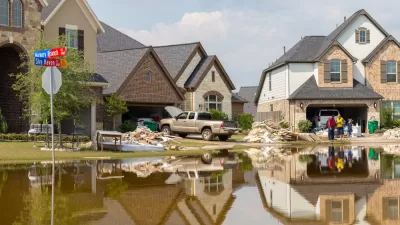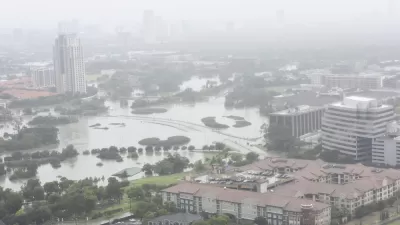In Houston, investors are snapping up damaged homes that will be dependent on flood insurance.

The Houston Chronicle’s latest long piece about the city’s recovery from Hurricane Harvey is focused on the investors —both individual and those backed by large corporations—who are buying up thousands of homes that were flooded during the storm.
“In the process, they are transforming some Houston neighborhoods into block after block of rentals. They're interrupting county plans to buy out flood-prone properties. And they're leaning on the taxpayer-funded National Flood Insurance Program to protect them from future floods.”
Owners are not required to tell renters that the homes are at risk of flooding, and it’s “unclear,” when the homes are part of larger funds, whether individual investors are told.
The “army of speculators” described in the article have already purchased at least 88 homes that are flood-prone enough that Harris County was looking to buy out the current owners; with a competitive housing market, finding renters will not be a problem.
The potential impact on planning for flood mitigation is significant; the reporters found that investors are already insuring their acquisitions through the flawed National Flood Insurance Program and, in fact, “several have said that such investments wouldn't be possible without the subsidized insurance.”
FULL STORY: In Houston’s flooded neighborhoods, real estate investors see an opportunity

Maui's Vacation Rental Debate Turns Ugly
Verbal attacks, misinformation campaigns and fistfights plague a high-stakes debate to convert thousands of vacation rentals into long-term housing.

Planetizen Federal Action Tracker
A weekly monitor of how Trump’s orders and actions are impacting planners and planning in America.

San Francisco Suspends Traffic Calming Amidst Record Deaths
Citing “a challenging fiscal landscape,” the city will cease the program on the heels of 42 traffic deaths, including 24 pedestrians.

Defunct Pittsburgh Power Plant to Become Residential Tower
A decommissioned steam heat plant will be redeveloped into almost 100 affordable housing units.

Trump Prompts Restructuring of Transportation Research Board in “Unprecedented Overreach”
The TRB has eliminated more than half of its committees including those focused on climate, equity, and cities.

Amtrak Rolls Out New Orleans to Alabama “Mardi Gras” Train
The new service will operate morning and evening departures between Mobile and New Orleans.
Urban Design for Planners 1: Software Tools
This six-course series explores essential urban design concepts using open source software and equips planners with the tools they need to participate fully in the urban design process.
Planning for Universal Design
Learn the tools for implementing Universal Design in planning regulations.
Heyer Gruel & Associates PA
JM Goldson LLC
Custer County Colorado
City of Camden Redevelopment Agency
City of Astoria
Transportation Research & Education Center (TREC) at Portland State University
Jefferson Parish Government
Camden Redevelopment Agency
City of Claremont





























